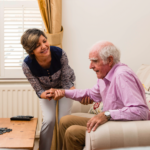Changes in Behaviour that Require Specialist Live in Care
Self-neglect, accidents around the house, trouble keeping up with medications, and withdrawal and isolation could all be indicators that your loved one needs specialist live in care.
Changes in behaviour that require specialist live in care
When someone starts to develop dementia, their deterioration in function can be gradual. Too often, mishaps, memory lapses and near-misses can be explained away as natural and normal effects of ageing, but there can come a time when it is no longer safe to live alone. So, when you start to notice these signs in excess, it could be a time to find a specialist live in care.
So how can you tell when someone you love needs live-in care?
You may have known and relied on your loved one for many years, so the idea that they could be unsafe living alone can be difficult to contemplate. However, the increasing memory loss and confusion of dementia can make cooking, cleaning and caring for themselves a real challenge.
Embarrassment, shame and the drive to maintain independence, can mean that they may understate the problems they face. However, there might be some giveaway indications that they need around-the-clock support like live in home care for the elderly.
Self-neglect
Washing, dressing and self-care require a complex combination of skills. If they are looking scruffy, unclean or wearing inappropriate clothing for the climate, they may be struggling to manage the usual activities of daily living. At this point, you should starting thinking about live in home care for the elderly.
Tablet troubles
Multiple medical conditions can mean a confusing cocktail of medications. How are they managing these?
Check for pills scattered around, bottles left open or supplies that don’t appear to be dwindling at the correct rate. Missing tablets or overdosing on potentially dangerous drugs is a genuine risk to their health. If you find any, it could be time to consider specialist live in care.
Accident prone
We all have the occasional little accident or slip-up, but near misses in the home can be an indication of increasing problems. Leaving the doors unlocked, setting a pan on fire, scalding themselves with the kettle, or becoming unsteady and prone to trips and falls can all be signs that a helping hand or live in home care for the elderly is needed.
Practical problems
Red bills, power supplies being cut-off or important appointments being missed can all indicate that your loved one’s memory loss is starting to affect their daily life. In the early stages, some extra support from you, monitoring, or daily in-home care can help them cope, but it is worth looking ahead and planning for the future too.
Withdrawal and isolation
Communication problems and difficulty following conversations can lead to a loss of confidence socially, and a tendency to withdraw. Loneliness can affect both physical and emotional health, leading to depression and low self-esteem. A live-in carer can provide company and can help facilitate social contact.
Wandering
People can become unsettled, restless and lost in the later stages of Alzheimer’s disease, which can increase the risk of wandering. It can be a real problem, causing stress to the family and putting the individual at risk of accident and injury. Live in home care for the elderly is one of the measure you can implement to avoid unnecessary accidents to your loved ones.
Nutrition and nourishment
Food is essential for fuel, fitness and to fight diseases. But shopping, preparing and eating food requires organisation, dexterity and thought. If your loved one is losing weight, or their kitchen has out-of-date food and unwashed pans, they may be losing the skills necessary to cook and care for themselves. More so, specialist live in care can recommend and assist with the correct diet plan for your loved ones.
Disturbance of the body clock
Alzheimer’s Disease and other causes of dementia can interrupt the body’s in-built rhythms of sleeping and waking. This may disturb your loved one’s sleep patterns, so that they become restless and agitated overnight. This can be exhausting and frustrating for any family carers, so that extra support and supervision is necessary.
Rest and respite
Family carers do an extraordinary job, supporting those they love. But the demands of work and family together with the stresses and strains of caring can take their toll. If you are struggling, it may be time to get some outside assistance. Time off can be great for your physical, mental and emotional health and allow you to return to caring with your energy and enthusiasm restored. Care can happen on your terms, for the amount of time you and your loved one requires. You can start at just a few hours a week, giving you time to see to your own errands and needs.
The idea that someone who was once capable should need outside help can be devastating. But care doesn’t have to be a negative step. By getting specialist live in care in place early, you can ensure that your loved one will be assisted in living in safety, comfort and dignity in their own home, without the need for residential care.
Find out more about live-in care:




